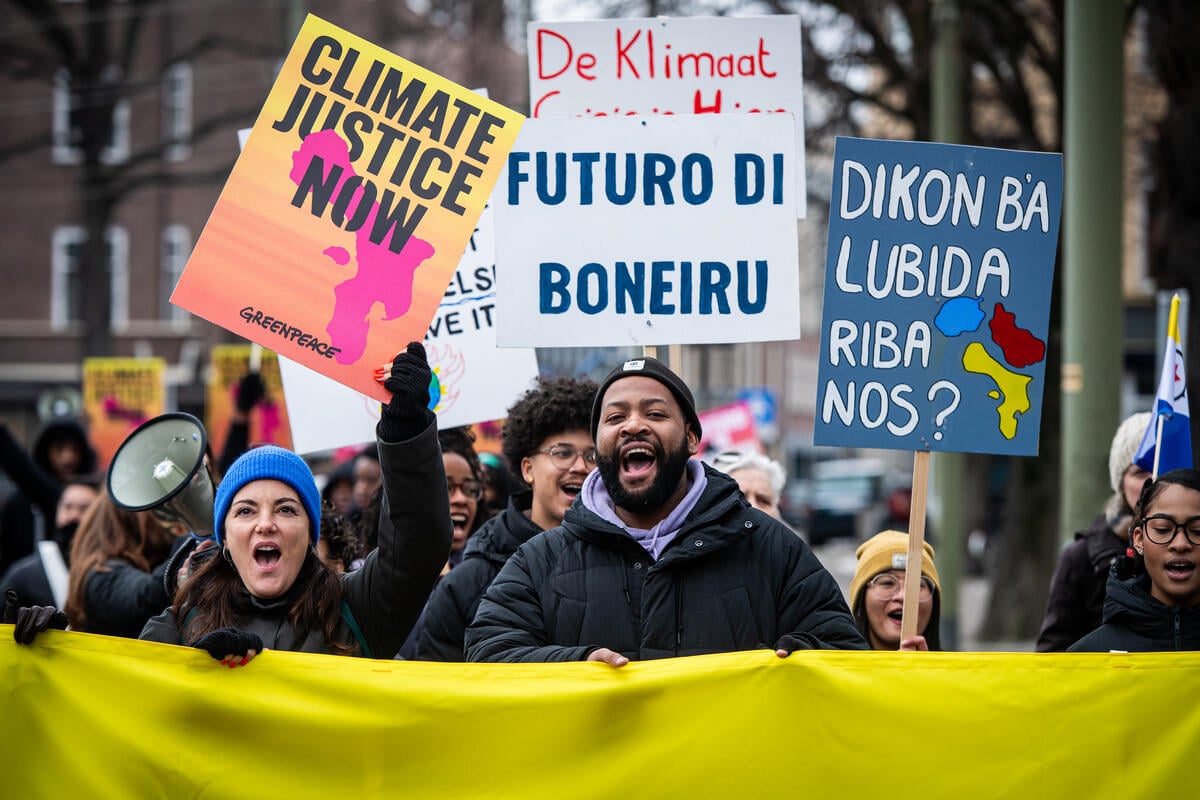The Hague – On 7 and 8 October, residents of the Dutch-Caribbean island Bonaire and Greenpeace Netherlands will face the Dutch State in court, arguing that it is violating human rights by unjustly failing to provide adequate protection against the effects of climate change for the residents of the Dutch special municipality of Bonaire.
Research commissioned by Greenpeace Netherlands shows that the climate crisis is already affecting daily life on Bonaire, the low-lying Caribbean island that is legally a part of the Netherlands. Residents are at great risk due to sea level rise, extreme weather and dying coral reefs. People are already experiencing the health effects of extreme heat. Without action, up to a fifth of the island could be underwater by the end of this century.
Judmar Emerenciana, graphic designer, Bonaire resident, and plaintiff in the Bonaire Climate Case, said: “I look forward to standing in court opposite a government that has looked the other way for years. [In Bonaire] It is too hot to walk or cycle outside. And when it rains, it rains so hard that everything is flooded and the roads are impassable. I’m concerned that rising sea levels will cause coral to disappear, with major consequences for the island’s prosperity. I am not here just for myself, but for everyone on Bonaire. We have a right to a future – just like everyone else. With this lawsuit, we are saying: enough is enough – we demand protection.”
It’s the first case in Europe that combines the demand for climate change adaptation measures in an overseas territory and increased mitigation measures to keep warming below 1.5°C. It also represents one of the first opportunities to see how recent landmark decisions on climate change, such as the International Court of Justice (ICJ) Advisory Opinion on the obligations of states with respect to climate change, will be used in a national court. In July, ICJ judges unanimously ruled that states must keep global warming below 1.5°C and that their climate plans must show maximum ambition, taking into account historical emissions and national circumstances.
The hearings take place at the District Court of The Hague, the same court that gave the world’s first order to a national government to reduce CO2 emissions faster in 2015.[1] This time, the residents of Bonaire and Greenpeace Netherlands are demanding that the government does its fair share to keep the world under 1.5°C of global warming, reduce greenhouse gas emissions to net zero by 2040 at the latest, and come up with concrete plans to protect Bonaire.
Marieke Vellekoop, director of Greenpeace Netherlands, said: “The Dutch State applies double standards when it comes to protecting citizens against the climate crisis. But while Bonaire is already paying the price for the climate crisis, the government continues to look the other way. This is not only unacceptable, but it also violates the fundamental rights of the people on the island. The Dutch State must honour its legal duty and offer the people of Bonaire the same protection as citizens living in the European part of the country. That is not a favour, it is its duty.”
Particularly for low-lying islands like Bonaire, keeping global warming below 1.5°C is non-negotiable, it’s central to the well-being and livelihood of the residents. The Netherlands’ government is currently not complying with the Dutch Climate Act and is instead protecting major polluters by providing fossil fuel subsidies and rolling back climate policy. The inhabitants of Bonaire and Greenpeace Netherlands demand that the Dutch State make its fair contribution to achieving global climate goals. Given its historical emissions, this means becoming climate neutral as soon as possible, by 2040 at the latest.
ENDS
Notes:
[1] https://www.urgenda.nl/en/themas/climate-case/
Contacts:
Laura Polderman – Greenpeace Netherlands press officer, +316 29 00 11 40, [email protected]
Join this WhatsApp group for journalists if you would like to stay up to date (in Dutch).
Greenpeace International Press Desk: +31 (0)20 718 2470 (available 24 hours), [email protected]
Source link
Greenpeace International www.greenpeace.org

